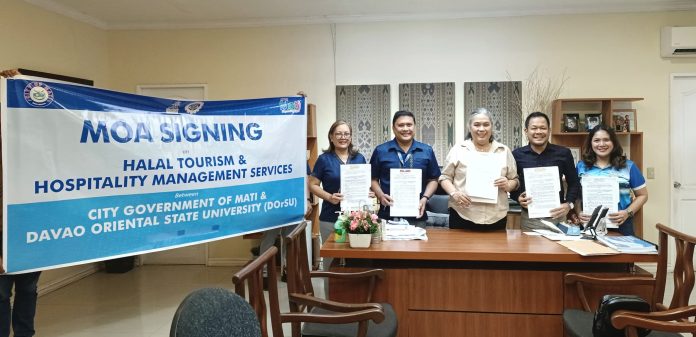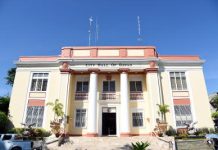In a significant step towards advancing sustainable and inclusive tourism, the Davao Oriental State University (DORSU) and the City Government of Mati, with the approval of the Mati City Council, signed a Memorandum of Agreement (MOA) aimed at enhancing halal tourism and hospitality services in the city.
The partnership was formalized with the signing of the MOA by Mati City Mayor Michelle Nakpil Rabat and DORSU President Dr. Roy G. Ponce, signifying a shared commitment to fostering inclusive and regenerative tourism development.
Under the agreement, DORSU, through its Center for Tourism Information, Education, and Communication (CTIEC), will provide technical expertise and educational support to the City Tourism and Promotions Office of Mati.
This partnership will focus on strengthening the city’s capacity to implement tourism programs that respect cultural diversity, particularly promoting halal tourism in compliance with City Ordinance No. 555, also known as the Halal Ordinance.
This ordinance emphasizes respect for Muslim religious beliefs, customs, and traditions while fostering tourism practices that are inclusive and sensitive to cultural and religious diversity.
DORSU’s role in this partnership includes providing technical assistance in the areas of research, capacity building, and program implementation.
Specifically, the university will:
1. Offer expert guidance during collaborative engagements on halal tourism and hospitality development.
2. Conduct and monitor research projects aligned with halal tourism initiatives.
3. Collaborate on designing and distributing communication, education, and public awareness materials and programs.
4. Recommend evidence-based policies for inclusive tourism through data-driven research.
On the other hand, the City Government of Mati, through its City Tourism and Promotions Office, has committed to ensuring the effective implementation of the partnership’s projects.
Its key responsibilities include:
1. Identifying and engaging targeted participants for the programs.
2. Providing supplies and materials for the production of education and public awareness campaigns.
3. Coordinating closely with DORSU in the design, conduct, and evaluation of projects and activities.
Mayor Michelle Nakpil Rabat highlighted the importance of the partnership in reinforcing Mati City’s position as a tourism hub in Mindanao.
“This collaboration with DORSU is more than just a partnership—it is a testament to our shared vision of inclusivity and cultural respect. Together, we aim to elevate Mati City as a model for sustainable and halal tourism, creating opportunities for economic growth while celebrating our diverse heritage,” she said.
The MOA reflects both parties’ dedication to advancing the principles of sustainable and regenerative tourism.
In addition to promoting halal tourism, the partnership will strengthen local capacities in hospitality services and prioritize inclusivity in tourism policies.
The agreement, which will remain in force for five years, also underscores the city’s commitment to boosting its tourism sector while addressing the needs of diverse communities.
The partnership is further expected to align with the city’s broader tourism goals, fostering collaboration between the local government, educational institutions, and stakeholders.
By integrating academic research and evidence-based strategies into local governance, the initiative aims to ensure long-term success and positive community impact.
This collaboration is part of Mati City’s ongoing efforts to position itself as the premier tourist destination in the Davao Region. (CIO MATI)







